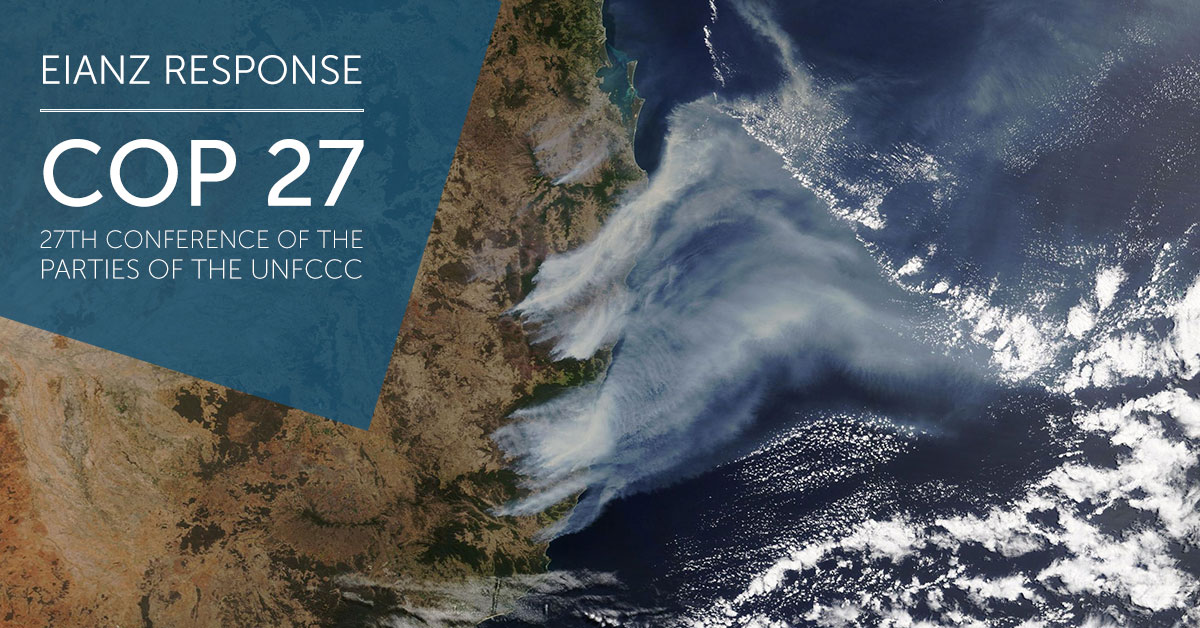-
Member Login
- Home
- About
- Institute Groups
- Membership
- Events
- News & Publications
- Institute Programs
- Resources
- Jobs Board
- Contact Us
- Site Info
EIANZ Response to COP27

The EIANZ welcomes agreement on a loss and damage fund and the calls for finance reform at COP27
The Environment Institute of Australia and New Zealand (EIANZ) welcomes the progress on a loss and damage fund made at The United Nations Framework Convention 27th Conference of Parties held in Egypt in November. This agreement was 30 years in the making and is a historic achievement.
EIANZ also welcomes the call to multilateral development banks and international financial institutions to reform practices and priorities and scale-up and mobilise climate finance.
- But the current decade was supposed to be the turn-around decade. And climate change, the causes of it and the global responses are not turning around.
- Mitigation – The mitigation window to maintain temperature rise to 1.5 degrees and avoid most serious climatic outcomes is close to shut. Nationally Determined Contributions for mitigation are inadequate and aren’t being fulfilled. The insufficient attention at COP27 to mitigation and phasing-out fossil fuel use is disappointing.
- Adaptation – Nations of the world remain under-prepared for the climate changes already baked-in and anticipated. Globally, nationally and locally we need better adaptation and interventions to maintain biodiversity and biosphere services. Especially, Australia needs to ramp up adaptation actions, domestically and with international partners. The Pacific Region should be a high priority.
- Loss and Damage – Much of the impact of climate change falls on those least equipped to bear it and who are the smallest contributors. At COP27 the “heads of agreement” for funding was accepted for wealthy nations to compensate developing states. However, details for fund establishment are to be agreed over the next 12 months and will determine the fund’s shape, extent and fairness.
COP27 seems to continue a well-worn path - making useful but inadequate progress. However, a redoubling of effort, not despair, is needed because every tonne of mitigation and every piece of adaptation counts.
Not only must governments globally redouble their efforts, but civil society needs to redouble its efforts: to give governments the authority to act more boldly; validate new technologies and approaches; and hold governments to account. And, where all else fails, individual governments need to act where Governments collectively cannot agree. Media has a special role in acting in sharing peer-reviewed climate science and news with honesty and integrity.
Environmental practitioners including all those in Australia and Aotearoa New Zealand must remain in the vanguard. As part of their work, climate change and energy specialists, ecologists, hydrologists, social scientists, impact assessors, planners and others aligned professionals need to commit to:
- immediate deep mitigation that leads to early zero net emissions
- adaptation for people, society, future generations, ecosystems and individual native species
- emergency and recovery response mechanisms.
More generally, practitioners need to boldly communicate the risks, a practical path forward and hope.
The Environment Institute of Australia and New Zealand is the peak professional body of environmental professionals in Australia and New Zealand. Through its Code of Ethics and Professional Conduct, it sets a high standard for environmental professionals to work to.
We acknowledge and value the rights and interests of Indigenous Peoples in the protection and management of environmental values through their involvement in decisions and processes, and the application of traditional Indigenous knowledge.

